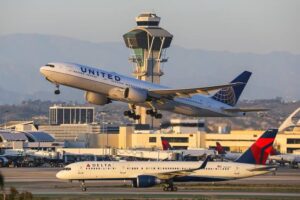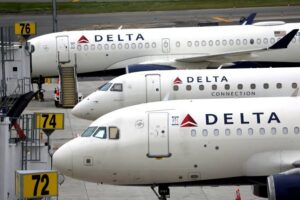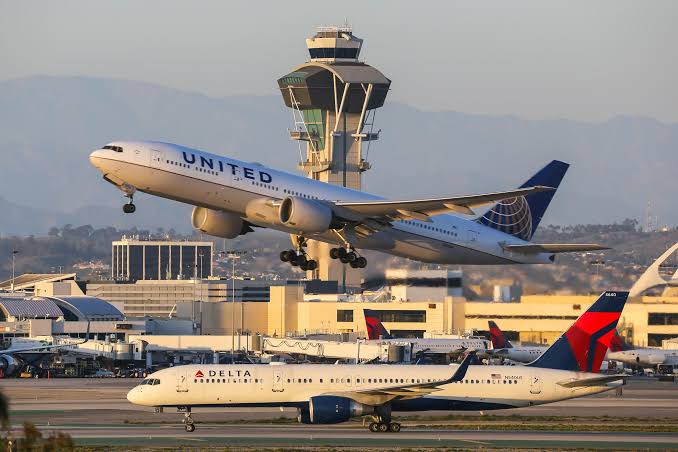Delta and United face slackening demand for international flights originating outside USA
April 17, 2025
Introduction
In early 2025, U.S. airlines, particularly Delta Air Lines and United Airlines, are grappling with a notable decline in demand for international flights originating outside the United States. This downturn is attributed to a confluence of economic uncertainties, geopolitical tensions, and shifting consumer behaviors. Despite previous optimism for a robust year, these carriers are now recalibrating their strategies to navigate the evolving landscape.

Economic Uncertainty Dampens Travel Demand
The global economic climate has become increasingly volatile, impacting consumer confidence and spending habits. Delta Air Lines recently slashed its first-quarter profit estimates by half, citing heightened macroeconomic uncertainty. CEO Ed Bastian noted that both corporate and consumer spending have softened, leading to a reduction in domestic travel demand .
Similarly, United Airlines has observed a decline in bookings, particularly in markets reliant on government travel. The airline attributes this to recent policy changes and budget cuts affecting federal employees, leading to a significant drop in government-related travel .
Geopolitical Tensions Affect International Routes
Geopolitical developments have further complicated the international travel landscape. The ongoing trade war initiated by former President Donald Trump has introduced tariffs and strained relations with several countries. These tensions have led to retaliatory measures, including boycotts and reduced travel to and from the United States .

In response, Delta and United have sought extensions for unused flight frequencies between the U.S. and China, citing reduced demand and market challenges. Both airlines have requested dormancy waivers from the U.S. Department of Transportation to retain their rights to these routes without operating them, reflecting the diminished demand in the U.S.-China market .
Strategic Adjustments in Capacity and Routes
To adapt to the changing demand dynamics, both airlines are implementing strategic adjustments. Delta has announced plans to reduce its summer capacity, acknowledging that its initial schedules were overly ambitious given the current demand environment. President Glen Hauenstein emphasized a shift towards flying only what is necessary, rather than maximizing capacity .
United Airlines is also taking measures to align its operations with market realities. The carrier plans to retire 21 aircraft early and reduce capacity in markets with high government travel and Canadian destinations. These decisions are influenced by decreased government spending and a decline in Canadian travel to the U.S., respectively .
Focus on Premium and Leisure Travel Segments
Despite the overall downturn, there are pockets of resilience within the travel industry. Both Delta and United have reported strong performance in premium cabins and international leisure travel. United’s first-quarter results highlighted a 9.2% increase in premium cabin revenue and a 5.2% rise in international passenger revenue per available seat mile, driven by affluent travelers seeking global vacations .
Delta has similarly observed robust demand in its premium offerings, with passengers showing a willingness to pay for enhanced experiences. The airline’s focus on premium seating and international routes has helped offset some of the declines in other segments .
Expanding and Adjusting International Routes
In an effort to capitalize on emerging opportunities, both airlines are expanding and adjusting their international routes. United plans to increase its flights to Lagos, Nigeria, from thrice-weekly to daily service, reflecting a commitment to the African market .
Delta is also enhancing its African network, introducing a direct flight from Atlanta to Accra, Ghana, and a daily seasonal service to Lagos, Nigeria. These additions aim to cater to the growing demand for travel between the U.S. and Africa .
Furthermore, both airlines are seeking greater flexibility in their South Africa routes to better match seasonal demand. Delta has requested to shift frequencies from its Atlanta-Johannesburg route to Atlanta-Cape Town during the southern hemisphere summer, while United aims to adjust its Newark-Johannesburg and Newark-Cape Town services accordingly .
Conclusion
The challenges faced by Delta and United Airlines in early 2025 underscore the complexities of the global aviation industry. Economic uncertainties, geopolitical tensions, and evolving consumer preferences have necessitated strategic adjustments in capacity, routes, and service offerings. By focusing on premium segments and adapting to market demands, these carriers aim to navigate the current headwinds and position themselves for future growth.






